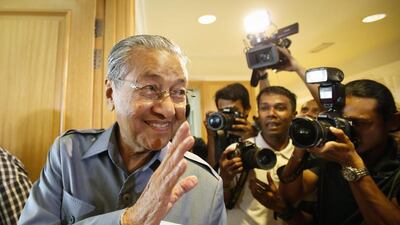Smiles were on the lips of the Malaysian prime minister, Najib Razak, and his predecessor, Abdullah Ahmad Badawi, as they left the Royal Chulan Hotel in Kuala Lumpur, the country’s capital, on Monday. This was not just because they had enjoyed the launch of a book commemorating Mr Najib’s 40 years in politics – although no doubt they had.
The smile – and no comments – were also their response to reporters asking them about an event that has made headlines around the world: the resignation of Dr Mahathir Mohamed, Malaysia’s longest-serving prime minister, from United Malays National Organisation (UMNO), the ruling party which he had led for 22 years.
As Mr Badawi and Mr Najib both succeeded Dr Mahathir as PM and as head of UMNO, an outside observer might have expected the pair to be shocked and saddened at the departure of the 90-year-old elder statesman. Had he not, as his biographer Barry Wain wrote, “put Malaysia on the map”? Since Dr Mahathir has expended considerable energy trying to wipe his two successors off it, however, their cheeriness was not so surprising.
Why was Dr Mahathir so keen to drive them both from office – succeeding in the case of Mr Badawi in 2009, but failing to do so with Mr Najib, despite campaigning against him since August 2014? The reasons are varied, but the main driver of his displeasure both times was the same: the two prime ministers courteously listened to his advice; and then made up their own minds, regardless of what he’d said.
After a while, Dr Mahathir became so enraged by their refusal to treat his counsel as orders to be obeyed – and by their unwillingness to carry out some of his pet projects, such as building the so-called “crooked bridge” to Singapore – that he set out to unseat them.
“I have tried to give my views to him directly,” wrote Dr Mahathir in 2014, complaining that Mr Najib didn’t listen. “I have no choice but to withdraw my support. This has not been effective so I have to criticise.”
Dr Mahathir, in other words, expected to be able to be a “back seat driver” and became very cross when he couldn’t. Hence the fireworks. Although as Dr Mahathir has already resigned from UMNO once before in 2008, and was in fact sacked from the party in 1969 after criticising the then prime minister and leader of UMNO, Tunku Abdul Rahman (does a pattern emerge?), the impact of his move has been less than he may have expected. It has in fact been welcomed by Mr Najib’s supporters. “Many UMNO members cried when Tun abruptly resigned as prime minister in 2002,” tweeted one minister. “But this time around, tears no more!”
As in cars, back seat drivers are generally unwelcome in politics. Indeed, the online Free Dictionary defines the term as “a passenger who gives unwanted and/or unneeded directions to the driver; also, a person who interferes in affairs without having knowledge, responsibility, or authority for doing so”. History bears their undesirability out.
Britain’s Margaret Thatcher undermined the prime ministership of her successor, John Major, from the start by saying just before she left office: “I shan’t be pulling the levers, but I shall be a very good back seat driver.” “This vow,” observed the Chicago Tribune at the time, “could be a weight around Major’s neck as he tries to become his own man.” So it proved; and arguably he never did.
When Dmitry Medvedev was Russian president from 2008 to 2012, his authority was not helped by the fact that the entire world knew he had swapped jobs with his real boss, Vladimir Putin, as a means for the latter to get around presidential term limits. When Mr Putin returned to the presidency in 2012, it merely confirmed that he had remained in charge all along.
When Joko Widodo won the presidency of Indonesia, there were those who worried that Megawati Sukarnoputri, under whose PDI-P banner Mr Widodo had run, would wield the real power.
Similarly, whoever becomes Myanmar’s next leader will be severely weakened by Aung San Suu Kyi’s insistence that she will be “above” and issuing instructions to the president (she is currently constitutionally barred from that office).
The situation is even worse in Poland, where in a recent poll 55 per cent said that the person who ran the country was Jaroslaw Kaczynski. True, he is the leader of the ruling Law and Justice Party – but what about Poland’s president and prime minister? Do they not have the mandate of the people?
To return to Dr Mahathir, when he left office he was quite clear. “I am not going to direct the government,” he said. “I’m not a back seat driver.” Unfortunately, he proved unable to keep to his word, as Mr Badawi and Mr Najib can both testify.
Dr Mahathir is unlikely to stop trying to eject Mr Najib from the driver’s seat. At least, however, now that the former leader has left UMNO, the Malaysian prime minister will not have to deal with distractions from the back. The IMF recently commended his stewardship of the country’s economy. In these challenging times, Mr Najib should be left to do the driving by himself.
Sholto Byrnes is a senior fellow at the Institute of Strategic and International Studies, Malaysia


